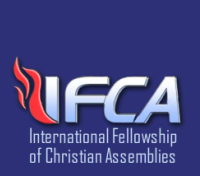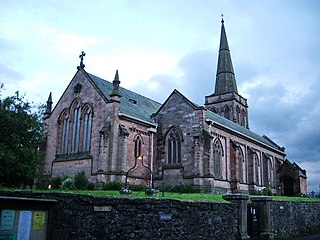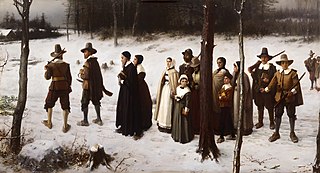
The Free Methodist Church (FMC) is a Methodist Christian denomination within the holiness movement, based in the United States. It is evangelical in nature and is Wesleyan–Arminian in theology.
Pentecostalism or classical Pentecostalism is a Protestant Charismatic Christian movement that emphasizes direct personal experience of God through baptism with the Holy Spirit. The term Pentecostal is derived from Pentecost, an event that commemorates the descent of the Holy Spirit upon the Apostles and other followers of Jesus Christ while they were in Jerusalem celebrating the Feast of Weeks, as described in the Acts of the Apostles.

The Church of the Nazarene is a Christian denomination that emerged in North America from the 19th-century Wesleyan-Holiness movement within Methodism. It is headquartered in Lenexa, Kansas. With its members commonly referred to as Nazarenes, it is the largest denomination in the world aligned with the Wesleyan-Holiness movement and is a member of the World Methodist Council.
The Holiness movement is a Christian movement that emerged chiefly within 19th-century Methodism, and to a lesser extent influenced other traditions such as Quakerism, Anabaptism, and Restorationism. The movement is historically distinguished by its emphasis on the doctrine of a second work of grace, which is called entire sanctification or Christian perfection. The word Holiness refers specifically to the belief in entire sanctification as a definite, second work of grace, in which original sin is cleansed, the heart is made perfect in love, and the believer is empowered to serve God. Churches aligned with the holiness movement additionally teach that the Christian life should be free of sin. For the Holiness movement, "the term 'perfection' signifies completeness of Christian character; its freedom from all sin, and possession of all the graces of the Spirit, complete in kind." A number of Christian denominations, parachurch organizations, and movements emphasize those Holiness beliefs as central doctrine.

The International Pentecostal Holiness Church (IPHC) or simply Pentecostal Holiness Church (PHC) is an international Holiness-Pentecostal Christian denomination founded in 1911 with the merger of two older denominations. Historically centered in the Southeastern United States, particularly the Carolinas and Georgia, the Pentecostal Holiness Church now has an international presence. In 2000, the church reported a worldwide membership of over one million—over three million including affiliates.

The Pentecostal/Charismatic Churches of North America (PCCNA) is an interdenominational fellowship of Pentecostal and charismatic churches and denominations in North America, existing for the purpose of promoting cooperation and understanding. It is a successor to the Pentecostal Fellowship of North America (PFNA). PCCNA headquarters are in Los Angeles, California.

The International Fellowship of Christian Assemblies (IFCA), formerly known as the Christian Church of North America (CCNA), is a North American Pentecostal denomination with roots in the Italian-American community, but is now a multicultural denomination. Central offices are located in Transfer, Pennsylvania. Ministries of the church include Benevolence, Home Missions, FOCUS, Foreign Missions, Education, Lay Ministries, and Public Relations. A convention is held annually, and their official publication is Vista, a quarterly magazine.
The Wesleyan Church, also known as the Wesleyan Methodist Church and Wesleyan Holiness Church depending on the region, is a Methodist Christian denomination in the United States, Canada, the United Kingdom, South Africa, Namibia, Sierra Leone, Liberia, Indonesia, and Australia. The church is aligned with the Wesleyan-Holiness movement and has roots in the teachings of John Wesley. It adheres to Wesleyan-Arminian doctrine and is a member of the World Methodist Council.

Within many denominations of Christianity, Christian perfection is the theological concept of the process or the event of achieving spiritual maturity or perfection. The ultimate goal of this process is union with God characterized by pure love of God and other people as well as personal holiness or sanctification. Other terms used for this or similar concepts include entire sanctification, holiness, perfect love, the baptism with the Holy Spirit, the indwelling of the Holy Spirit, baptism by fire, the second blessing, and the second work of grace.

The Higher Life movement, also known as deeper Christian life, the Keswick movement or Keswickianism, is a Protestant theological tradition within evangelical Christianity that espouses a distinct teaching on the doctrine of entire sanctification.

The conservative holiness movement is a loosely defined group of theologically conservative Christian denominations with the majority being Methodists whose teachings are rooted in the theology of John Wesley, and a minority being Quakers (Friends) that emphasize the doctrine of George Fox, as well as River Brethren who emerged out of the Radical Pietist revival, and Holiness Restorationists in the tradition of Daniel Sidney Warner. Schisms began to occur in the 19th century and this movement became distinct from parent Holiness bodies in the mid-20th century amid disagreements over modesty in dress, entertainment, and other "old holiness standards". Aligned denominations share a belief in Christian perfection, though they differ on various doctrines, such as the celebration of the sacraments and observance of ordinances, which is related to the denominational tradition of the specific conservative holiness body—Methodist, Quaker, Anabaptist or Restorationist. Many denominations identifying with the conservative holiness movement, though not all, are represented in the Interchurch Holiness Convention; while some denominations have full communion with one another, other bodies choose to be isolationist.

The Evangelical Methodist Church (EMC) is a Christian denomination in the Wesleyan-Holiness tradition headquartered in Indianapolis, Indiana. The denomination reported 399 churches in the United States, Mexico, Burma/Myanmar, Canada, Philippines and several European and African nations in 2018, and a total of 34,656 members worldwide.
The Christian Holiness Partnership is an international organization of individuals, organizational and denominational affiliates within the holiness movement. It was founded under the leadership of Rev. John Swanel Inskip in 1867 as the National Camp Meeting Association for Christian Holiness, later changing its name to the National Holiness Association, by which it was known until 1997, when its current name was adopted. Its stated purpose is to promote "the message of scriptural holiness" primarily through evangelistic camp meetings. The Christian Holiness Partnership is headquartered in Clinton, Tennessee.
The Evangelical Church of North America (ECNA) is a Wesleyan-Holiness, Protestant Christian denomination headquartered in Clackamas, Oregon. As of 2000, the Church had 12,475 members in 133 local churches. The Church sponsors missionaries in seven countries.

The Assemblies of God USA (AG), officially The General Council of the Assemblies of God, is a Pentecostal Christian denomination in the United States and the U.S. branch of the World Assemblies of God Fellowship, the world's largest Pentecostal body. The AG reported 2.9 million adherents in 2022. In 2011, it was the ninth largest Christian denomination and the second largest Pentecostal denomination in the United States. The Assemblies of God is a Finished Work denomination, and it holds to a conservative, evangelical and classical Arminian theology as expressed in the Statement of Fundamental Truths and position papers, which emphasize such core Pentecostal doctrines as the baptism in the Holy Spirit, speaking in tongues, divine healing and the Second Coming of Jesus Christ.
Kevin W. Mannoia is the Pastoral Coach at the Rock Church, San Diego. He is a Professor of Ministry and formerly the University Chaplain at Azusa Pacific University. He was the President of the National Association of Evangelicals from 1999 to 2001. Prior to this, he served as Bishop of the Free Methodist Denomination overseeing the western U.S. and Asia. In addition to his principal role at Azusa Pacific University, he is Founder and Chair of the Wesleyan Holiness Consortium, a contemporary manifestation of the Holiness movement comprising denominations and institutions sharing a common heritage in the Wesleyan and Holiness tradition. He also serves as President of the International Council for Higher Education, an international organization of institutions of higher learning focused upon integrated learning in the Christian tradition.
Finished Work Pentecostalism is a major branch of Pentecostalism that locates sanctification at the time of conversion; afterward the converted Christian progressively grows in grace. On the other hand, the other branch of Pentecostalism—Holiness Pentecostalism teaches the Wesleyan doctrine of entire sanctification as a definite second work of grace, which is a necessary prerequisite to receive the baptism in the Holy Spirit. Finished Work Pentecostals are generally known to have retained the doctrine of progressive sanctification from their earlier Reformed roots, while Holiness Pentecostals retained their doctrine of entire sanctification from their earlier Wesleyan roots.

Protestantism is the largest grouping of Christians in the United States, with its combined denominations collectively comprising about 43% of the country's population in 2019. Other estimates suggest that 48.5% of the U.S. population is Protestant. Simultaneously, this corresponds to around 20% of the world's total Protestant population. The U.S. contains the largest Protestant population of any country in the world. Baptists comprise about one-third of American Protestants. The Southern Baptist Convention is the largest single Protestant denomination in the U.S., comprising one-tenth of American Protestants. Twelve of the original Thirteen Colonies were Protestant, with only Maryland having a sizable Catholic population due to Lord Baltimore's religious tolerance.
The Global Wesleyan Alliance (GWA) is an ecumenical organization of Christian denominations who adhere to Wesleyan-Arminian (Methodist) theology. It was formed in Anderson, Indiana, in 2011.
The Interchurch Holiness Convention (IHC), formerly the Interdenominational Holiness Convention, is an ecumenical organization of denominations and congregations within the conservative holiness movement. Aligned with the conservative holiness movement, the majority of these IHC members are Methodist, though others have a Quaker, Anabaptist or Restorationist background. There are a number of denominations aligned with the conservative holiness movement, however, that are not affiliated with the Interchurch Holiness Convention. The IHC was founded in 1952 during the post-World War II era. Thousands of individuals are present at the Interchurch Holiness Convention's annual international meeting that is usually held in Dayton, Ohio or in Gatlinburg, Tennessee; in addition the Interchurch Holiness Convention hosts regional meetings at local churches in different parts of the world throughout the year.












